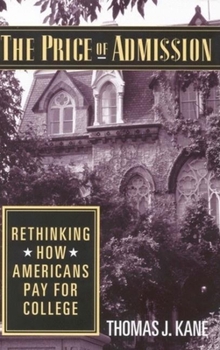The Price of Admission: Rethinking How Americans Pay for College
Select Format
Select Condition 
Book Overview
" Over the past fifteen years, a college education has become increasingly valuable in the labor market. As a result, the stakes have been raised in the debate over college admissions and student financial aid. With the gap in college enrollment widening by family income, the time has come to examine the strengths and weaknesses of the American system for financing higher education and to rethink its structure from the ground up. This book begins...
Format:Paperback
Language:English
ISBN:0815750137
ISBN13:9780815750130
Release Date:October 1999
Publisher:Brookings Institution Press
Length:176 Pages
Weight:0.55 lbs.
Dimensions:0.5" x 6.0" x 9.0"
Customer Reviews
1 rating
"Price" is worth the price
Published by Thriftbooks.com User , 24 years ago
"Price of Admission" is a book to read along with McPherson and Schapiro's "The Student Aid Game." Together they make up a two volume library on federal higher education policy the likes of which could not be collected in a hundred lesser titles.Thomas Kane writes four easy-reading chapters on "How We Pay for College," "Rising Costs in Higher Education," "Has Financial Aid Policy Succeeded in Ensuring Access to College?", and "Rethinking How Americans Pay for College." To each chapter he brings empirical research and impressive analysis. Kane's last two chapters are the most provocative. Repeating the findings of his earlier works, Kane is not convinced that federal student financial aid has done much to ensure college access. He offers both modest and ambitious policy suggestions: dropping asset tests to simplify financial aid applications, front-loading Pell Grants during the first two years of college, raising federal student loan program limits, experimenting with various forms of financial aid, and basing means-tests on future earnings through income contingent tax credits.Some experts in higher education policy may react to the book with a yawn because none of these policy prescriptions is new, and none original with Kane. But if so, they are missing the essence of the book. Like few others, Kane prods the U.S. Department of Education to begin more ambititous evaluations of its student financial aid programs, and challenges the Congress to think beyond dividing up the billions of dollars of bounty among narrow interests of banks and higher education institutions.Careful readers of Kane, as well as of McPherson and Schapiro, will notice a growing recognition that the behavior of higher education institutions, more than federal policy, determines how access is distributed. Kane is troubled, as we all should be, by the fact that "the gaps in college entry by family income have widened" despite the efforts of federal need-based student financial aid. He notes that "aid packaging and the marketing of federal financial aid programs remain largely in the hands of college student financial aid administrators [and] as a result, the process remains shrouded in mystery." Kane suggests that lowering the barriers involved in the process may have a larger payoff for some students than increasing federal aid.





